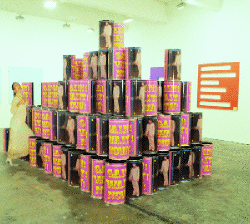Cary Leibowitz
Andrew Kreps, New York, USA
Andrew Kreps, New York, USA

How exactly is one supposed to go about writing a damning review of an exhibition by Cary Leibowitz? The fact that the artist's entire creative persona has long been predicated on the idea of acting like a loser's loser would seem to deflect any negative comment, to constitute the perfect defence mechanism. Does it make any sense, for example, to suggest that he isn't as good at being bad as he used to be? Leibowitz, along with Mike Kelley, Sean Landers and others, first garnered widespread attention as an example of the American abject or slacker tendency of the early 1990s. But the artist formerly known as Candy Ass now worries that he may have lost the self-loathing necessary to put on a sufficiently self-deprecating display, admitting that 'having a show every six or seven years is a lot of pressure'.
Leibowitz's paintings have a bold, cartoon-like quality. Cheerful ice-cream colours are combined with the kind of childish lettering that graphic designers use when attempting to create an effect of studied ineptitude. Here the paintings were hung with highly visible and unnecessarily large nails. Even the invitation for the opening was produced, with apparent haste, in the style of a photocopied yard sale flyer, complete with tear-off strips and a silly pun on the director's name (Andrew's Crepes + Art Gallery). The whole enterprise exuded cuteness and, while Leibowitz knows that he may never win our adoration, he is more than ready to accept our pity.
Stop Copying Me (all works 2001) is a row of small pink panels, each one mimicking the words of the title, apart from two in the middle which ask 'Do these pants make me look Jewish?'. The scenario is that of the playground bully or annoying sibling targeting any point of potential insecurity for want of anything better to do. Of course there is a knowing artiness about the work too; repetition and seriality used to be serious formal issues before this guy came along. A similar note is struck by Hi Fatty ... Hi, in which an orange rectangle and a beige disc exchange greetings, the words of the title rendered across the middle of each in an attractive shade of purple. Remove the text and you have a serious Minimalist abstraction. Stick with it and you have something more reminiscent of Sigmar Polke's Higher Beings Command: Paint the Top Right Corner Black (1969), in which a similarly sparse composition is ironically explained away via a sarcastic allusion to mysticism.
Leibowitz's petty squabble (one hesitates to call it an argument) about the vocabulary and function of painting continues with a series of panels incorporating a variety of cut-out sections. Painting Without a Soul has a round void at its centre, while Painting Without any Reasons is missing four horizontal lines, representing the text of an absent explanation. Painting Without a Heart has had a pastry-cutter version of that particular organ stamped out of its right side, while Painting Without a Perspective lacks four diagonals that point from each corner to a vanishing point somewhere in the centre. Painting With No Way Out, Painting With a Way Out consists of two panels, one of which has a brass doorknob attached. Again Leibowitz reduces the essentials of image making and the ongoing debate about its demise to a collection of self-consciously dumb wisecracks. It's a healthy enough response every now and then, but one can't help wondering how long it will be before Leibowitz paints himself into a corner. Of course, this is a predicament he might enjoy more than most.
In the centre of the gallery is a supermarket-like display of Leibowitz's editioned Garbage Can and Umbrella Stand. Both items bear the image of the artist as a portly adolescent on the occasion of his Bar Mitzvah in 1976. The legend 'Gain! Wait! Now!' is emblazoned on each in ornate fairground-style lettering. This, he says, is 'very much in keeping with my long-standing history of wanting/needing/hoping/praying for things to improve in my own impatient way'. Leibowitz is nothing if not consistent. A decade ago he complained that 'I feel like I'm a victim of everything'; now, on the occasion of his ninth solo show in New York, he seems to be a little more accepting but no less pessimistic, and perhaps with good reason. The original context for his work has since been so thoroughly absorbed into the contemporary aesthetic sensibility that his simple variations on a theme feel inadequate for all the wrong reasons.
























